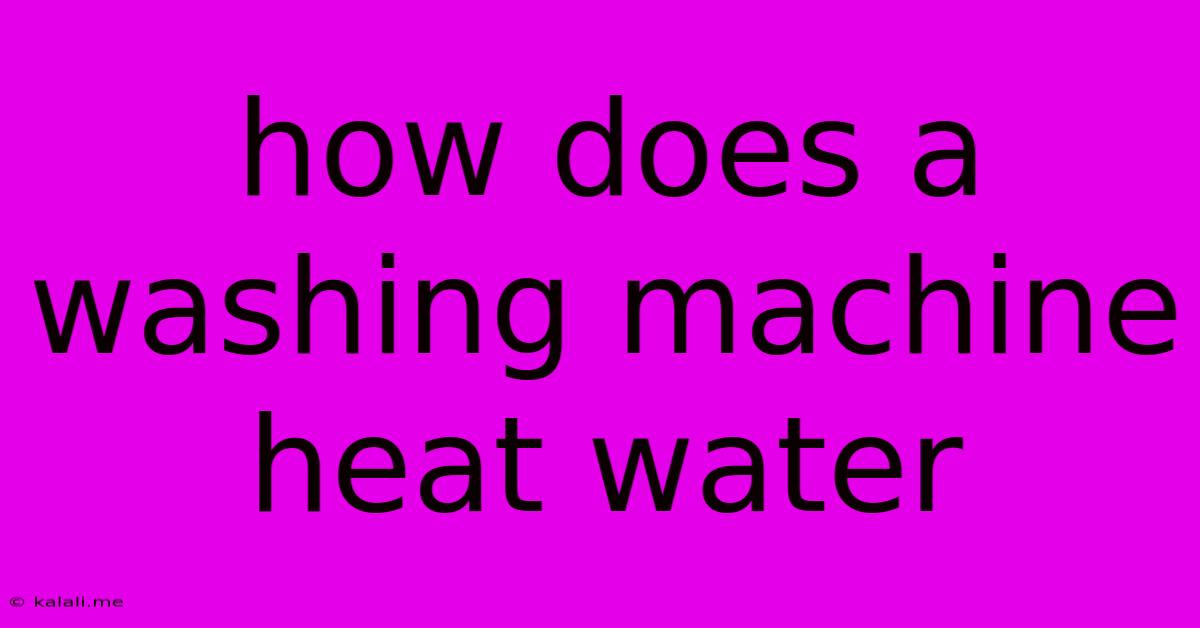How Does A Washing Machine Heat Water
Kalali
May 21, 2025 · 3 min read

Table of Contents
How Does a Washing Machine Heat Water? A Deep Dive into Heating Elements and Systems
This article explores the inner workings of your washing machine, specifically focusing on how it heats the water for optimal cleaning. Understanding this process can help you troubleshoot issues and maintain your appliance effectively. We'll cover different heating methods, common components, and potential problems.
Washing machines utilize electricity to heat water, achieving the temperatures required for various wash cycles. While the exact method might vary slightly depending on the brand and model, the core principles remain the same. Let's delve into the specifics.
The Heating Element: The Heart of the System
The most common method of water heating in washing machines is through an electric heating element. This component is typically a resistive element, similar to the one found in electric kettles or space heaters. When activated, electricity flows through the element, generating heat. This heat is then transferred to the water surrounding the element within the washing machine's drum or tub. The element is usually made of a durable material like nickel-chromium alloy, capable of withstanding the high temperatures and corrosive effects of water and detergent.
How it Works: The heating element is immersed in the water. As electricity passes through the element's resistive material, it creates significant heat due to its resistance. This heat then conducts to the surrounding water, gradually raising its temperature to the desired level. A thermostat monitors the water temperature, switching the heating element on and off to maintain the selected wash temperature.
Other Heating Methods (Less Common):
While electric heating elements are prevalent, some high-end washing machines might employ alternative methods, though they're less frequently encountered:
-
Gas Heating: While uncommon in residential washing machines, some commercial models use gas heating. These machines require a gas line connection and utilize a gas burner to heat the water. This method is generally less efficient than electric heating for home use due to safety concerns and installation complexity.
-
Heat Pump Technology: These models use a heat pump system similar to those found in some air conditioners. This system extracts heat from the surrounding air to heat the water, resulting in significantly lower energy consumption compared to traditional electric heating. This is a more eco-friendly option, although often associated with a higher initial purchase price.
Troubleshooting Common Heating Issues:
If your washing machine isn't heating water properly, several issues could be at play:
-
Faulty Heating Element: This is the most common cause. The element may be burnt out, corroded, or covered with mineral deposits, preventing efficient heat transfer.
-
Malfunctioning Thermostat: A faulty thermostat might prevent the heating element from activating or cause it to shut off prematurely, leading to insufficient water heating.
-
Wiring Problems: Loose or damaged wiring connecting the heating element and thermostat can interrupt the heating process.
-
Thermostat Sensor Issues: Incorrect readings from the temperature sensor can lead to incorrect heating.
-
Low Water Level: The heating element requires a sufficient water volume to function efficiently. A low water level could prevent proper heating.
Maintaining Your Washing Machine's Heating System:
Regular maintenance can prolong the lifespan of your washing machine's heating system:
-
Regular Cleaning: Avoid excessive detergent buildup and regularly clean the washing machine's interior and detergent dispensers to prevent mineral deposits from accumulating on the heating element.
-
Proper Water Supply: Ensure a sufficient water pressure and consistent water supply to prevent issues related to water level and heating efficiency.
-
Address Issues Promptly: Don't ignore warning signs. If you notice inconsistencies in water heating, address the problem promptly to prevent further damage and costly repairs.
Understanding the mechanisms behind your washing machine's water heating system empowers you to better maintain and troubleshoot any potential problems. By recognizing the common components and potential issues, you can extend the lifespan of your appliance and ensure consistently clean laundry.
Latest Posts
Latest Posts
-
Is The Possession Of Hannah Grace A True Story
May 21, 2025
-
For The Avoidance Of Doubt Meaning
May 21, 2025
-
Latin For It Is What It Is
May 21, 2025
-
Do You Have To Have Xbox Live To Play Minecraft
May 21, 2025
-
Why Do My Cat Follow Me To The Bathroom
May 21, 2025
Related Post
Thank you for visiting our website which covers about How Does A Washing Machine Heat Water . We hope the information provided has been useful to you. Feel free to contact us if you have any questions or need further assistance. See you next time and don't miss to bookmark.